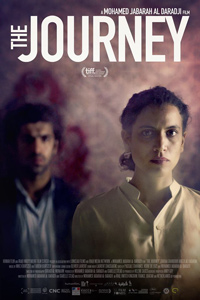Salam Baghdad! Al-daradji Looks at Second Chances

A young woman walks into a crowded Baghdad train station, her finger poised on a detonator. Sara (played by newcomer Zahraa Ghandour, whose intense gaze is captivating for every moment it’s on screen) is a suicide bomber. The Journey – an Iraq, United Kingdom, France, Qatar, and Netherlands co-production directed by Mohamed Jabarah Al-daradji opens abruptly on a tone of solemn suspense.
Foiled in her initial mass murder attempt by a smooth-talking con man who accidentally happens to walk by, Sara takes Salam (Ammer Ali Jabarah) hostage with the intent of killing him along with herself and everyone else in their surroundings. But a variety of coincidences, all at times provocative, promising, or violent, interfere with Sara’s plan and eventually lead her to question what fostered her unwavering commitment to killing in the first place.
Jabarah Al-daradji’s story is careful not to give too much away; we spend a good twenty minutes compelled to know more about how and why Sara got to where she is. When we finally learn more, the transition from ostensible villain to complex (even sympathetic) character is barely perceptible. A languid yet succinct pace (82 minutes is just enough here) creates the ever-present feeling of doom as Sara and Salam grow slowly from enemies to co-conspirators to each other’s eventual saviours. Salam, too, transforms from a two-dimensional caricature of a loudmouthed Don Juan to a sharp and sensitive soul whose careful words to Sara initiate her second thoughts about her plan.
Unfortunately, the light touch applied to Salam and Sara’s characterizations is absent when it comes to the rest of the cast of characters. While the duo’s suspenseful journey is the central concern, the film also intercuts side-narratives, including the dynamics between a group of children and a couple of American soldiers investigating the threat of terrorism at the train station.
The children are a little too analogous: after a few aggressive kids tease and beat up a sweet shoe-shine boy, the latter refuses to take revenge on his oppressors when given the chance, insisting he doesn’t want to be like them—the typical valorization of a child’s purity of ethics and intent. Similarly, the portrayal of American soldiers as foul-mouthed, angry, racist bigots with thick southern accents is a bit too on-the-nose. It shouldn’t be (and isn’t) that hard to create a subtler portrait of an archetypal political villain in a war film.
Besides its hypnotic pace and appropriately distressing handheld camerawork, the film’s finest achievement is its sound. The sound design by Oliver Laurent and Laurent Chassaigne, as well as the original score by Mike Kourtzer and Fabien Kourtzer (better known as the composer duo Troisième Auteur) all build a tense yet touching atmosphere. An impromptu funeral march near the film’s end, set to a strolling brass musician playing heartwrenchingly sparse minor notes, is indicative of the film’s deft touch with its aural landscape.
The Journey is a fine example of poetic, thoughtful, and careful filmmaking. While perhaps lacking a little bit of nuance and complexity in its script and characterization, the overall atmosphere it creates is an unforgettable one. Ghandour’s performance in particular is laudable. She says a lot with only a little; a twitch of the lip, a nod of the head. And yet the topics under discussion here are nothing less than life or death.
Reviewed on September 9th at the 2017 Toronto International Film Festival – Contemporary World Cinema Programme. 82 Mins.
★★½/☆☆☆☆☆


